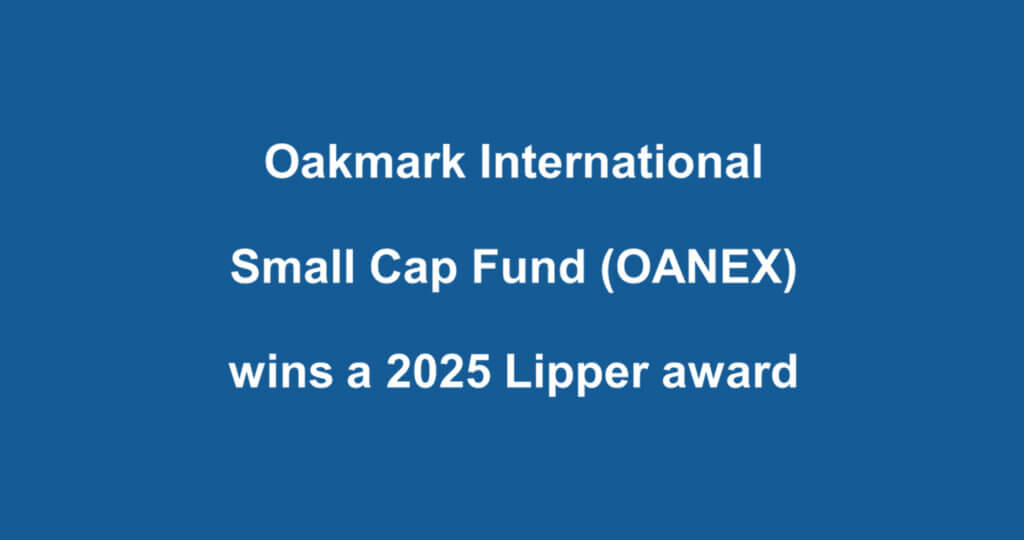Oakmark International Small Cap Fund - Investor Class
Average Annual Total Returns 09/30/11
Since Inception 11/01/95 9.34%
10-year 11.47%
5-year -1.83%
1-year -10.72%
3-month -19.94%
Gross Expense Ratio as of 09/30/10 was 1.38%
Past performance is no guarantee of future results. The performance data quoted represents past performance. Current performance may be lower or higher than the performance data quoted. The investment return and principal value vary so that an investor’s shares when redeemed may be worth more or less than the original cost. The performance of the Funds does not reflect the 2% redemption fee imposed on shares redeemed within 90 days of purchase. To obtain the most recent month-end performance data, view it here.
The Oakmark International Small Cap Fund lost 20% in the quarter ended September 30, 2011, compared to a 19% loss for the MSCI World ex U.S. Small Cap Index. For the fiscal year ended September 30, the Fund declined 11%, while the MSCI World ex U.S. Small Cap Index was down 6%. For the past 10 years, the Fund has earned an annualized rate of return of 11%, compared to the MSCI World ex U.S. Small Cap Index, which has returned 10% for the same period.
The top-performing stock for the one-year period was Italian jeweler and luxury goods retailer Bulgari. Earlier this year, we wrote that the French luxury group LVMH Moet Hennessy Louis Vuitton SA planned to acquire the largely family-owned Bulgari. The announced acquisition price was approximately 60% higher than the previously traded share price. LVMH’s offer exceeded our expectations for Bulgari by close to 10%, and we used the run-up in share price as an opportunity to divest our holdings and use the proceeds to buy stocks trading at a larger discount to our estimate of fair value.
Despite a continued difficult economic climate in Japan, temporary staffing firm Pasona was one of the top performers for the quarter and the year. While Pasona’s earnings declined as a result of weak demand for temporary staff in Japan, we believe Japan is one of the most attractive long-term markets for temporary staffing companies due to low penetration levels and the aging of the Japanese work force. A number of global staffing companies have acquired businesses in Japan in recent years to gain a foothold to this attractive market. Even with the stock’s appreciation this year, Pasona still trades at less than 0.2x of the company’s revenue, which represents a significant discount to what acquirers have been willing to pay for Japanese temporary staffing firms. In addition to an inexpensive valuation, management has made significant progress in reducing SG&A (selling, general & administrative) expenses, which should lead to higher margins once the revenue environment improves. We believe Pasona continues to trade at a significant discount to intrinsic value and will continue to provide positive operating results for our shareholders.
One of the largest detractors from the Fund’s performance for the past quarter and year was Goodman Fielder, Australia’s largest food manufacturer. The company sells a wide variety of brands in supermarkets throughout Australia and New Zealand. The company has faced a very difficult environment over the past few quarters, which has reduced profitability. In response, it recently hired a new CEO from outside the group to overhaul operations and strategy. In September 2011, shares of Goodman halted trading for three days after the company made an announcement of a $A259 million capital raise via a rights offering. The rights offering will provide Goodman the cash cushion it needs to implement a proper strategic review, which should be released in the fourth quarter. We believe the new CEO has a realistic view of the challenges facing Goodman and has the operational capability to tackle these issues. We also believe that he is willing to alter the portfolio of brands if necessary to create value for shareholders. Although this holding has not yet generated a desirable outcome, we believe that Goodman is a very undervalued company with strong market positions.
Like other European financials, Germany ’s financial services firm MLP has been hurt by the sovereign debt crisis. MLP has no direct exposure, but the environment is making it difficult to sell higher-yielding savings products due to the perception of more risk in the marketplace. However, MLP’s cost-cutting plan should allow the company to earn 15% operating margins by the end of next year. We believe that recent trends of individuals in Germany needing supplemental savings and health plans will continue, and this should benefit MLP in the mid- to long-term. We continue to find MLP an attractive investment.
We sold Bureau Veritas and Kimberly-Clark de Mexico from the Fund during the quarter and we added three new securities: Kansai Paint (Japan), Premier Farnell (U.K.) and Tecan Group (Switzerland). Kansai Paint is the largest paint and coatings manufacturer in Japan. Its products are used primarily for automobiles, ships, bridges and residential housing. The majority of the company’s business comes from Japan, but it also has customers in Europe, the U.S., China and India. Premier Farnell is a global distributor of electrical, electronic and industrial products primarily by means of internet transactions. Tecan develops, manufactures and distributes laboratory automation components and systems. The company produces robotic sample processors, stand-alone separation and detective devices, laser scanners, integrated systems, and pumps and valves for high-precision liquid handling. Its products are mainly used by research and diagnostic laboratories.
Geographically, we ended the quarter with our European and U.K. holdings comprising 51% of the portfolio, and the Pacific Rim holdings decreasing from 48% to 46% of the Fund.
Although the dollar has strengthened in the past quarter, we continue to believe it remains weak relative to a number of currencies held in the Fund, and we maintained our hedges on these currencies. At the recent quarter-end, approximately 74% of the Fund’s Swiss franc, 83% of the Australian dollar, 74% of the Japanese yen, 55% of the Norwegian krone, 45% of the Swedish krona and 28% of the euro exposures were hedged.
We believe large market dips create opportunities for us to enhance our Fund with quality investments at deeply discounted prices. While we were active in the portfolio this past year, we remained true to our value-oriented investment philosophy and are optimistic that our consistency will benefit shareholders over the long term.
We thank you for your continued confidence and support.
As of 9/30/11, Bulgari SpA represented 0%, LVMH Moet Hennessy Louis Vuitton SA 0%, Pasona Group, Inc. 2.6%, Goodman Fielder, Ltd. 3.3%, MLP AG 2.3%, Bureau Veritas SA 0%, Kimberly-Clark de Mexico S.A. de C.V., Class A 0%, Kansai Paint Co., Ltd. 1.3%, Premier Farnell PLC 1.8%, and Tecan Group AG, Registered Shares 0.6% of the Oakmark International Small Cap Fund’s total net assets. Portfolio holdings are subject to change without notice and are not intended as recommendations of individual stocks.
The MSCI World ex U.S. Small Cap Index (Net) is a free float-adjusted market capitalization index that is designed to measure global developed market equity performance, excluding the U.S. The MSCI Small Cap Indices target 40% of the eligible Small Cap universe within each industry group, within each country. MSCI defines the Small Cap universe as all listed securities that have a market capitalization in the range of USD200-1,500 million. This benchmark calculates reinvested dividends net of withholding taxes using Luxembourg tax rates. This index is unmanaged and investors cannot invest directly in this index.
The stocks of smaller companies often involve more risk than the stocks of larger companies. Stocks of small companies tend to be more volatile and have a smaller public market than stocks of larger companies. Small companies may have a shorter history of operations than larger companies, may not have as great an ability to raise additional capital and may have a less diversified product line, making them more susceptible to market pressure.
Investing in foreign securities presents risks that in some ways may be greater than U.S. investments. Those risks include: currency fluctuation; different regulation, accounting standards, trading practices and levels of available information; generally higher transaction costs; and political risks.The discussion of the Funds’ investments and investment strategy (including current investment themes, the portfolio managers’ research and investment process, and portfolio characteristics) represents the Funds’ investments and the views of the portfolio managers and Harris Associates L.P., the Funds’ investment adviser, at the time of this letter, and are subject to change without notice.







